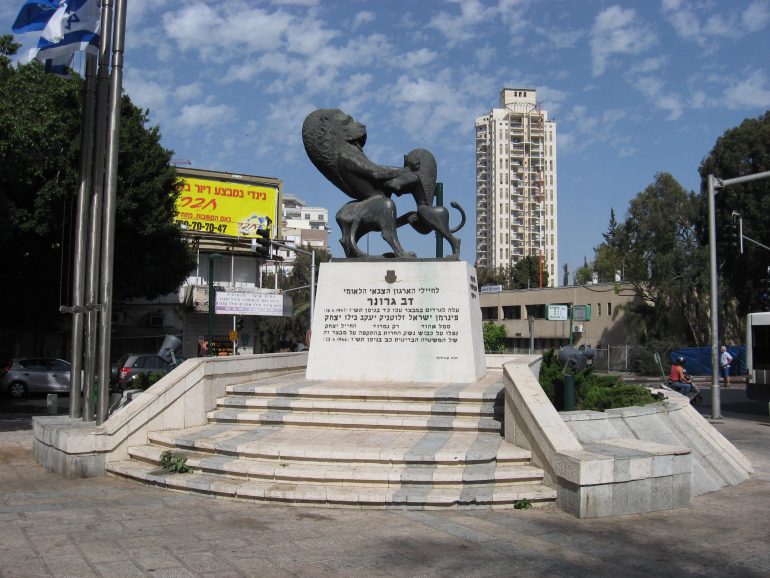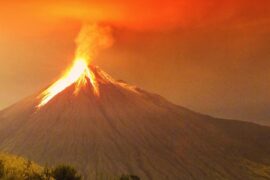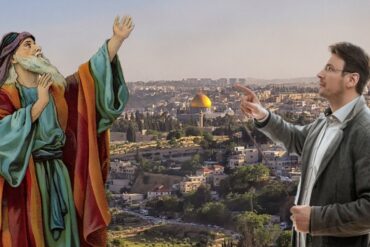Between Israel’s slavery in Egypt and the final redemption in Jerusalem, the story of the Exodus continues throughout time. In every generation we find challenges and heroes in our unbroken struggle for complete liberation as we inch ever closer toward history’s ultimate goal.
The festival of Pesaḥ is the holiday of Israel’s initial emancipation, marking the birth of the Hebrew nation and HaShem’s great love for us. It was on this day that the Kadosh Barukh Hu took Israel out from Egyptian slavery in order that we become His human representatives in this world. We were brought from subjugation to freedom in order that we establish the civilization meant to express His Divine Ideal and bless humanity with the light of His Truth – a light that can only be illuminated through Israel experiencing complete independence in our historic homeland. It is therefore precisely on Pesaḥ – on the birthday of the Hebrew nation – that we must educate ourselves to the true value of freedom.
Rashi teaches that the miracles of the Exodus began on the tenth of Nisan, a few days prior to the festival. It was on this date that Israel overcame our fears and psychologically freed ourselves from the chains of bondage. Each household prepared to slaughter a lamb, one of Egypt’s most prominent national deities, and displayed it defiantly for our oppressors to see. Although the Egyptians would naturally seek to punish their Hebrew slaves for such an offense, the children of Israel remained miraculously unharmed. This was therefore the day on which the miracles of redemption truly began and when Hebrew courage was first demonstrated after so many years of persecution.
On Pesaḥ of 5707 (1947), the last year of British rule over Palestine, an important seder took place in the Jerusalem Central Prison. A few days before their scheduled executions by the foreign regime, six young men were conducting the Pesaḥ seder with Rabbi Yaakov Goldman. They were Dov Gruner, Mordekhai Alkaḥi, Yeḥiel Drezner, Eliezer Kashani and Meir Feinstein from the Irgun Zvai Leumi (National Military Organization) and Moshe Barazani from the Loḥamei Ḥerut Yisrael (Fighters for the Freedom of Israel). Dressed in their red death row jumpsuits, these boys were provided with haggadot and food so that they could sit together and celebrate the holiday of their people’s freedom for the last time.
The young men eventually arrived at the part of the Haggadah that relates Rabbi Akiva and other sages discussing the Exodus from Egypt all night in B’nei Brak. When dawn broke, their students came to inform them that it was time to say “Sh’ma Yisrael.”
The prisoners sitting around the table discussed where these rabbis might have been that they could not see the light of day in order to know the time. It is well known that these sages had supported the Bar Kokhba Revolt against the Roman Empire and that Rabbi Akiva had even served as Bar Kokhba’s personal arms bearer. Acting as the spiritual leader of the insurrection, Rabbi Akiva had gone so far as to proclaim Bar Kokhba the Messiah. These rabbis must have been hiding in caves from where they were organizing the revolt against Rome. They were discussing the Exodus – the importance of freedom – all night long. And when dawn broke, their students came to tell them that it was time for “Sh’ma Yisrael” – time to sanctify G-D’s Name through liberating the land of Israel from foreign rule.
Nearly two thousand years later, these six young men – freedom fighters captured and sentenced to death – were reading the story of the rabbis in B’nei Brak. Dov Gruner remarked to the others: “It is a shame that our political leaders do not learn what Rabbi Akiva said, that if the Egyptians had not received fifty makkot (plagues/strikes) and another two hundred and fifty makkot at the sea, they would never have granted the Hebrews their freedom. If Rabbi Akiva understood that in order to become free, there had to be makkot, then why is it so difficult for Israel to understand now that we must give makkot to the British in order to win our freedom?”
Dov Gruner – psychologically ready to be executed by the British administration – internalized the teachings of Rabbi Akiva, who had himself been brutally executed by Rome. Now, after nearly two thousand years of terrible degradation, the students of Rabbi Akiva had at long last arrived. The students that history had been waiting for had come to proclaim that dawn was finally braking. The students – all dressed in red and eating a prison seder only days before their executions by a modern incarnation of Rome – had arrived to reestablish a sovereign Hebrew state – even if at the expense of their lives. These were men who walked in the path of Rabbi Akiva, knowing that it was their final Pesaḥ seder before singing HaTikva and mounting the British gallows. And without fear or regret, they questioned why the official Jewish leadership of their generation had not understood the eternal teachings of redemption.
Prior to his execution, Gruner wrote a farewell letter to his commander, Menaḥem Begin:
Sir, From the bottom of my heart I thank you for the encouragement that you have given me during these fateful days. Be assured that whatever happens I shall not forget the principles of dignity, generosity and resolve. I shall know how to uphold my honor, the honor of a Jewish soldier and fighter.
I could have written in high-sounding phrases something like the old Roman “Dulce et decorum est pro patria mori” (“it is sweet and proper to die for one’s country”). But words are cheap, and skeptics can say “after all, he had no choice.” And they might even be right. Of course I want to live. Who doesn’t? But what pains me, now that the end is so near, is mainly the awareness that I have not succeeded in achieving enough. I too could have said “let the future take care of the future” while enjoying life and being content with the job I was promised upon my demobilization. I could even have left the country altogether for a safer life in America. But this would not have satisfied me, neither as a Jew nor as a Zionist.
There are many schools of thought as to how a Jew should choose his way of life. One way is that of the assimilationists who have renounced their Jewishness. There is also another way, the way of those who call themselves Zionists – the way of negotiation and compromise, as if the existence of a nation were but another transaction. They are not prepared to make any sacrifice and are therefore forced to make concessions and accept compromise. Perhaps this is a means of delaying the end but, in the final analysis, it leads to the ghetto. And let us not forget that in the ghetto of Warsaw alone there were five hundred thousand Jews.
The only way that seems, to my mind, to be right, is the way of the Irgun Zvai Leumi, the way of courage and daring without renouncing a single inch of our homeland. When political negations prove futile, one must be prepared to fight for our country and our freedom. Without them the very existence of our nation is jeopardized, so fight we must with all possible means. This is the only way left to our people in our hour of decision: to stand on our rights, to be ready to fight, even if for some of us this way leads to the gallows. For it is a law of history that only with blood shall a country be redeemed. I am writing this while awaiting the hangman. This is not a moment at which I can lie, and I swear that if I had to begin my life anew I would have chosen the same path, regardless of the consequences.
Your faithful soldier, Dov
Dov Gruner embodied the teachings of Rabbi Akiva and understood the struggle for freedom in Eretz Yisrael as the highest and truest service to HaShem. After receiving Gruner’s letter, Menaḥem Begin wrote:
Great is the courage in Israel at a time of destruction and in this time of resurrection. We will be proud of them all and in all of them we will recognize holiness. But in the ladder of Jewish heroism, there is one level that is supreme. And from that level arises those who are Harugei Malkhut (martyrs of the kingdom). They were fighters whose fighting was not passive. It was active. They were revolutionaries whose revolution was not without choice but initiated. They went to the gallows and their heroism was not once. It is eternal. From their bleeding hearts, a song of freedom was sung. The song that sang how there is no purpose in being slaves anymore and that freedom would win and justice would arrive. And now, G-D of Israel, I tell You: Because You have given Israel such children as these, I say “Yitgadal V’Yitkadash Sh’mei Rabbah.”
Begin declares “Yitgadal V’Yitkadash Sh’mei Rabbah” – “May His Great Name be exalted and sanctified.” The evidence that G-D’s Name is exalted and sanctified is that Israel has sons who are prepared to give their lives – boys ready to sacrifice themselves on the alter of Israel’s freedom so that the next generation would see a Hebrew flag over Jerusalem.
The legendary tzadik of Jerusalem, Rabbi Aryeh Levine, came to see Yeḥiel Drezner before he was taken to the gallows. When Drezner asked the pious sage for help with the confessional viddui before death, Rabbi Levine began to cry. He told the young fighter not to worry about death and that the viddui tefillah is not necessary for martyrs.
And dawn broke. The British retreated from Eretz Yisrael shortly after the execution of these courageous boys. A Hebrew flag signifying renewed Jewish independence once again soared over portions of our homeland, initiating the first flowering of Israel’s redemption.
The Talmud (Brakhot 20a) asks why Israel experienced less open miracles in Talmudic times than in Biblical times. The sages question if it might be because the Jewish people in Talmudic times were less immersed in the study of Torah. But the Talmud dismisses this and answers that it can be proven that there were Biblical generations that studied less Torah yet still experienced greater miracles. The Talmud continues by revealing that the difference is not due to a distinction in scholarship but rather to a distinction in self-sacrifice for the Hebrew mission. Israelis in Biblical times were more willing to give their lives for the sanctification of G-D’s Name. The Talmud therefore concludes that miracles are a result of courage and selfless devotion. When Israel is ready to meet HaShem half way, we are rewarded with assistance and great Divine kindness.
So dawn breaks not when Rabbi Akiva has students who merely study the Torah but rather when he has students who actually live the Torah and are willing to give their lives for the fulfillment of the Hebrew mission. The young death row inmates understood what the Haggadah means when it proclaims that next year the Jewish people will be free. In blood and fire Hebrew sovereignty fell and in blood and fire it would again rise. The Haggadah is not simply a book that teaches us what took place once upon a time in Egypt. Nor is it merely an instruction manual for properly conducting the rituals of a seder. The Haggadah in every generation is meant to teach Israel how to liberate our people and to understand the basic values of our freedom. The heroic martyrs of the pre-state Jewish underground were not simply fighters. They were educators – educators for a generation who did not yet understand the true meaning of freedom. And when the Jewish people will understand the true significance and value of Hebrew liberation, there will no longer be any necessity for such martyrs.
The lesson is clear. Freedom is a miracle and miracles require valor. History demands that Israel establish a kingdom that will manifest the Divine Ideal in all spheres of national life in order to liberate humanity from a world of systemic injustice and false dogmas. But in order to accomplish this lofty mission we must first psychologically free ourselves, as did our ancestors in Egypt on the tenth of Nisan. The sooner we believe in ourselves and in our ability to stand proud as a strong moral force among nations, the closer we will come to expressing the full grandeur of HaShem’s Ideal for this world and ushering in an era of total blessing for humankind.





